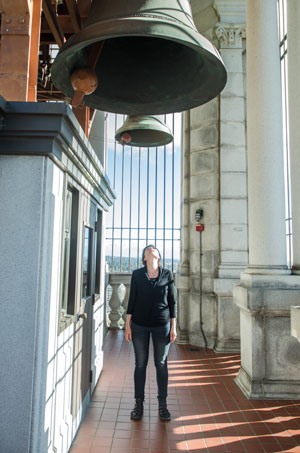UC Berkeley’s celebrated bells will be rung more than usual this weekend at the Eighth Berkeley Carillon Festival. On Saturday and Sunday, campus musicians will perform 45-minute recitals twice daily — on Saturday at noon and 1 p.m. and on Sunday at 2 and 3 p.m.

University Carillonist Jeff Davis will be one of this weekend’s performers. (UC Berkeley photo by Stephen McNally)
The event, free and open to the public, will honor the Class of 1928, which in 1978 raised funds to turn the tower’s 12-bell chime into a 48-bell concert carillon. The carillon’s original 12 bells, a gift of Jane K. Sather, were installed and first played in 1918.
In 1983, a multimillion-dollar gift from Jerry Chambers, a 1928 Berkeley alumnus, and his wife, Evelyn, upped the number of bells to 61 and changed the concert carillon to a grand carillon.

In 1978, 36 new bells were hung in the tower. (UC Berkeley photo)
The Chambers’ endowment also provided for a permanent, fulltime university carillonist in the Department of Music — there is no position like it today at any other North American university — as well as a campanology library, practice rooms and keyboards and a carillon festival every five years.
Festivals have held at Berkeley every five years, except in 2008, when no funds were available.
This weekend, carillonists will play music written for Berkeley’s carillon by local composers and others. Featured performers will include University Carillonist Jeff Davis and campus carillonists David Hunsberger, Wesley Arai, Leslie Chan and Erika Anderson.
The best listening places will be in Faculty Glade by Morrison Hall and on the Campanile Esplanade. For inquiries, please contact ucbells@berkeley.edu.
Last year, when the tower’s 12 oldest bells turned 100 , Davis said carillon would not be operable in as few as five years if the rusting mechanism that activates the clappers that strike the bells isn’t replaced. He added that repairs would cost $1.5 million.

Music from the Campanile’s carillon can be heard for seven miles. (UC Berkeley photo)
“This mechanism wasn’t the best that was available at the time,” said Davis, “and some parts — the roller bars — are positioned so close together that you can’t get a tool in there to knock the rust out. The bars also have bent — they’re no longer straight, but arched — and that makes the carillon increasingly difficult to play.”
In addition, he said, the keyboard needs replacing, and the clappers must undergo a heat process to protect them from wearing. The treble bells, which he called “among the most beautiful treble bells in the world,” should be relocated to the top of the carillon so that their sound can bounce off the coffered ceiling and down to the ground, where currently it’s hard to hear them.
Added Davis, “We’re looking at $1.5 million, at least.”
The carillon, which turned 100 in 2015 , “is the only thing on campus that affects everyone,” he said. “Most people tell me that when they think of Cal, they think of the sound of the bells and the tower. It’s iconic to them.”
For donations to the carillon, please contact the Department of Music.
